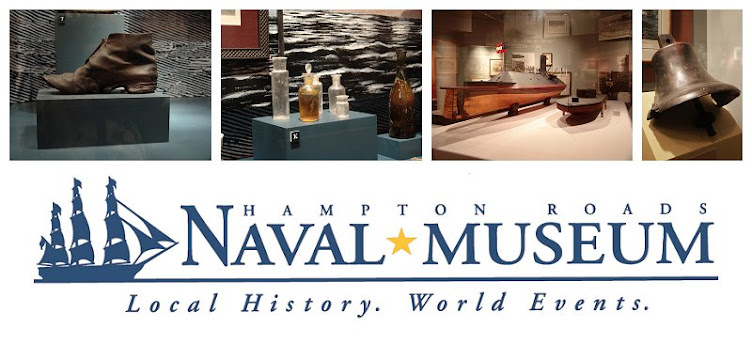


Ditty boxes were small, lockable containers carried aboard ship by sailors and used to store their most prized possessions. Items might include personal papers such as journals and letters, pocket watches, cigarettes, grooming and writing implements as well as small working and sewing tools. Early boxes came in different sizes and shapes designed to fit the owner’s needs. These were usually constructed from pine with dovetail joinery, and decorated with maritime images. Prior to WWI, the US Navy issued six by six by twelve inch white wooden boxes that contained holders for an ink bottle, pens and pencils. Sometime around WWII the box was exchanged for a small brown suitcase which is no longer issued.
This 19th century folk art sailor’s box is a new addition to the museum’s collection, and was recently examined for conservation needs as part of an award from the Virginia Association of Museums’ assessment grant program. The wooden box is decorated with brass tacks and plates marked “USS Wasp”, ”R”, “M” and “1809”.
The USS Wasp, a sloop of war commissioned in 1807, made her mark during the War of 1812. On October 16, 1812 she went to battle with the HBM Frolic, capturing the brig after a brief fight. However, the victory was short lived as the nearby British 74-gun ship-of-the-line Poictiers overwhelmed the Wasp forcing her commanding officer Master Commandant Jacob Jones to surrender. USS Wasp was briefly put into service as the Peacock with the Royal Navy, but went down off the capes of Virginia in 1813.
This 19th century folk art sailor’s box is a new addition to the museum’s collection, and was recently examined for conservation needs as part of an award from the Virginia Association of Museums’ assessment grant program. The wooden box is decorated with brass tacks and plates marked “USS Wasp”, ”R”, “M” and “1809”.
The USS Wasp, a sloop of war commissioned in 1807, made her mark during the War of 1812. On October 16, 1812 she went to battle with the HBM Frolic, capturing the brig after a brief fight. However, the victory was short lived as the nearby British 74-gun ship-of-the-line Poictiers overwhelmed the Wasp forcing her commanding officer Master Commandant Jacob Jones to surrender. USS Wasp was briefly put into service as the Peacock with the Royal Navy, but went down off the capes of Virginia in 1813.

No comments:
Post a Comment